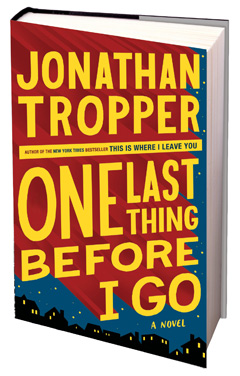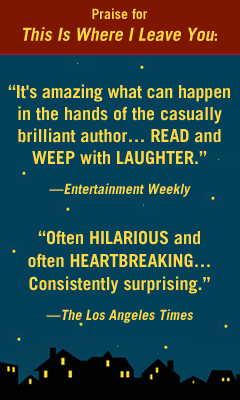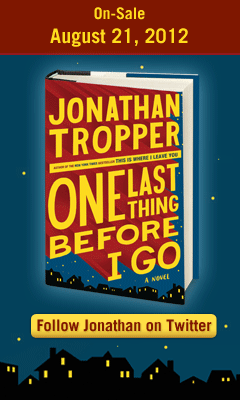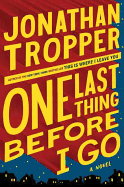One Last Thing Before I Go
by Jonathan Tropper
Jonathan Tropper--who has garnered well-deserved praise for novels that illuminate the pathos and comedy of modern family life--scores again with One Last Thing Before I Go, a sharp and very funny study in dysfunctionality and middle-age crisis in a time of economic chaos and collapsing hope. The protagonist here is Silver, an unhappily divorced man in his 40s with a Princeton-bound daughter who resents him and a life that is going nowhere slowly. Once a drummer in a one-hit-wonder band that disintegrated ("Rest in Pieces," their chart-topper, was written by Silver), he now gets by on diminishing royalties and playing weddings and bar mitzvahs. Silver readily admits that he's been a lousy husband and father, and feels he's gotten what he deserves--days of hanging by the pool of a rundown efficiency hotel with his equally loser buddies, each with their own tales of lost wives, children and dreams. He can't even bring himself to dislike his ex-wife Denise's fiancé, Rich, a relentlessly decent surgeon. "The only thing worse than not having your dream come true," Silver meditates at one point, "is having it come true for a little while."
Then, just as he's turning his self-pity up to eleven, his daughter, Casey, shows up and drops a bombshell: she's pregnant. The reader eventually learns more about Casey than Silver does at this point--for example, that she's only had sex once, with a neighbor boy she's known since childhood, and that she's terrified. Tropper flits between Casey's and Silver's points of view, allowing us to watch as Casey sets him up and he takes the bait. Tropper's insights into human nature are on full display here. Casey fumes inwardly that her father's response to any crisis is to offer ice cream. Sure enough, as soon Casey shares her secret, Silver suggests they go get a cone. Eager to please her, Silver steps up to the plate--sort of. He won't do the one thing that Casey wants most, which is to make the decision for her, but he offers his support and to pay for an abortion. At one point in their back-and-forth, Silver blacks out, only to wake up in a hospital bed with Rich standing over him telling him that he will die if he doesn't have an operation immediately to repair an aortic tear. The decision seems to be a simple one, but the narrative takes an unusual turn when Silver refuses the surgery and leaves the hospital.
Silver's reason to forgo the surgery is unclear, but it's all of a piece with his general inability to commit to anything. His passive-aggressive resistance also drives the rest of the narrative as family and friends close in on him, trying to make him change his mind. Casey reminds him that it would be particularly selfish of him to leave her life now that he's finally reentered it; his father, a rabbi, takes him to a variety of life events (a funeral, bar mitzvah and a bris) so that he can understand the concept of family and community bonds, and his formerly apathetic friends begin to get irritated at his lack of interest in saving his own life.
As his illness progresses, Silver experiences a series of mini-strokes that cause him to become more philosophical, direct and, appropriately for someone facing death, to question the nature and existence of God. It also leads him to speak the (largely inappropriate and often hilarious) thoughts in his head without realizing it until he sees the shocked looks on the faces around him. It's a device expertly used by Tropper to examine the minutiae of family relationships in extremis. Silver's new personality alarms, charms but, finally, infuriates his family. There is only so long, after all, that they can stand his endless confessions and naked soul before the structure of all their lives splinters and has to be reassembled. Even here, Tropper's comic touches shine: when the tension between Rich and Silver finally erupts, neither will punch the other because, as a surgeon and a drummer, both use their hands for a living.
As the novel careens to its satisfying and not entirely expected ending, Tropper leavens the humor with many tender moments, but never manipulates our emotions. Both the laughs and the tears in this sweet and clever novel are genuine and well-earned. And while there are many scenes so well-constructed they could be stories on their own and several quietly brilliant character studies, One Last Thing Before I Go is ultimately, happily, a great deal more than the sum of its parts. --Debra Ginsberg, author









 Jonathan Tropper
Jonathan Tropper